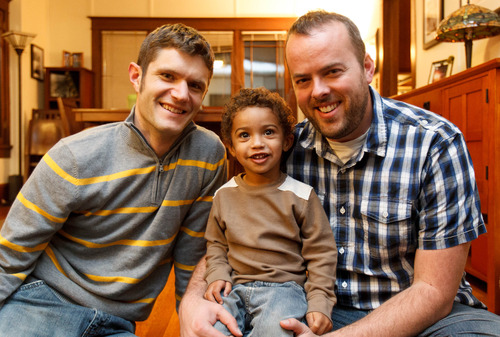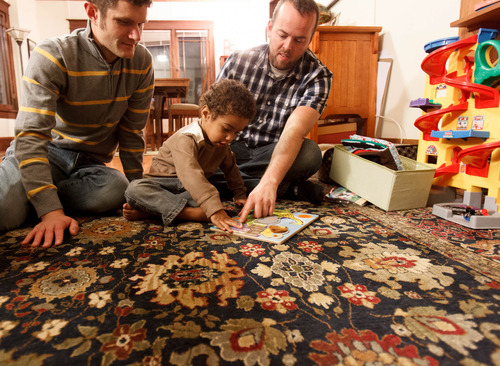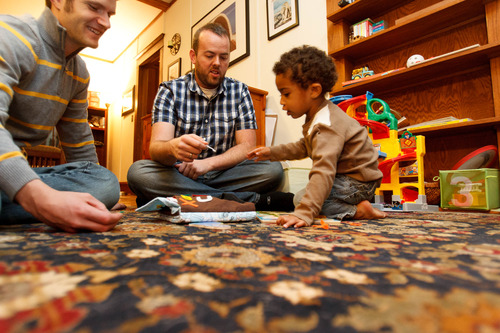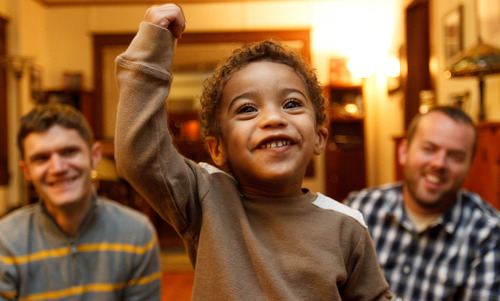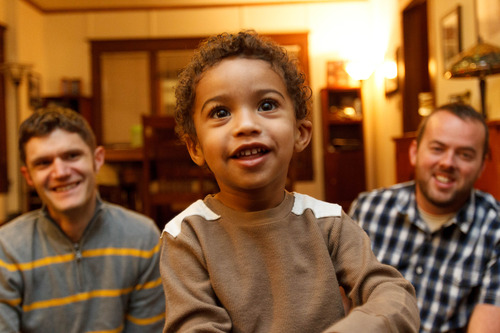This is an archived article that was published on sltrib.com in 2012, and information in the article may be outdated. It is provided only for personal research purposes and may not be reprinted.
Weston Clark hopes to one day marry the person he loves — even if his family looks different from most in Utah with a male partner and their 2-year-old son.
And he now has renewed hope, especially since voters in three states this week — Maine, Maryland and Washington — approved same-sex marriage, marking the first time the issue was approved by voters instead of the result of legislative or court action.
"It was a pretty tremendous day on Tuesday," Clark, a Utah native, said. "It feels like something's changed."
Many gay Americans — including Clark and his partner, Brandon Mark, who have lived openly as a couple for 12 years — are looking to have the same benefits as those in traditional marriages.
As the first openly gay generation slides into middle age, the number of states welcoming them to marry has grown. There now are nine states that offer same-sex marriage, including Connecticut, Iowa, Massachusetts, New Hampshire, New York and Vermont, plus the District of Columbia and two Native American tribal jurisdictions, the Coquille tribe of Oregon and the Suquamish tribe of Washington.
Still, the controversial issue is far from over. Clark and other gay Utahns said even though there's a growing sense of inclusion for gay couples, 41 states, including Utah, still do not recognize same-sex marriage.
In 2004, Beehive State voters overwhelmingly approved a constitutional amendment banning gay marriage. Utah, like many states at the time, already had a law defining marriage as only between a man and a woman, but Amendment 3 specifically does not recognize same-sex marriages, even if they are performed in a state where they are legal. Amendment supporters at the time said the issue would be on firmer legal ground if it were embedded in the Utah Constitution.
Clifford Rosky, a University of Utah associate professor of law who specializes on the issue, said the latest election results in three states, while significant, would have no impact in Utah.
"All of these developments have nothing to do with Utah" because of Amendment 3, Rosky said, noting it would take a vote of two-thirds of the Legislature and a majority of voters to repeal that measure. "It's implausible."
Many now look toward the U.S. Supreme Court.
The justices may agree in the next few weeks or months to hear the gay-marriage California case, Hollingsworth v. Perry, dealing with Proposition 8. Still, Rosky said, it is unlikely the nine justices will tackle that state issue.
"The Supreme Court rarely gets out in front of public opinion," Rosky said.
He pointed to comments by Justice Ruth Bader Ginsburg in October, when she suggested that her predecessors on the high court mistimed the 1973 Roe v. Wade case, which legalized abortion nationwide. Alluding to the persisting bitter debate over abortion, Ginsburg said the justices of that era could have delayed hearing any case like Roe while the state-by-state process evolved. At the time, abortion was legal on request in four states, allowed under limited circumstances in about 16 others and outlawed under nearly all circumstances in the other states.
More likely, observers said, today's Supreme Court will have something to rule about a much narrower legal question: whether the federal Defence of Marriage Act, or DOMA, is constitutional. Two federal appeals courts have struck down the part of the law that requires the federal government to deny benefits to same-sex couples married in states that allow such unions.
"When a federal law is struck down," Rosky said, "it's a national issue by definition."
In the coming weeks, legal advocates on both sides will wait to see if the high court takes up the same-sex marriage issue or lets the issue evolve in the 50 states.
Brandie Balken, executive director of Equality Utah, the state's largest LGBT-rights group, said she wants the latest news to put a spotlight on gay Utahns.
"I think realistically what it will do is allow us to continue the conversation of equal protections under the law," Balken said. "Today you can be fired or evicted in Utah [for being gay]."
Salt Lake City, Salt Lake County, Park City, Moab and a number of other local governments have adopted employment and housing protections for gay and transgender residents. But such anti-discrimination proposals have stalled in the Legislature.
While waiting for lingering legal developments, Clark said he and his family will continue to live out their day-to-day lives just as everyone else. The couple adopted their son, Xander, in another state two years ago because Utah law makes it difficult for same-sex partners to adopt.
"Three more states approved same-sex marriage, and we have the first president to come out in support of it," Clark said. "So, it's not a deal breaker."
On Nov. 1, five days before the election, President Barack Obama wrote to 10-year-old Sophia Bailey Klugh, who had sent a note thanking him for his support of gay marriage, according to The Huffington Post. Sophia wrote to the president: "I am so glad that you agree two men can love each other because I have two dads and they love each other, but at school kids think that it's gross and weird, but it really hurts my heart and feelings."
Obama responded: "In America, no two families look the same. We celebrate this diversity. And we recognize that whether you have two dads or one mom what matters above all is the love we show one another."
Twitter: @rayutah —
Same-sex marriage Issue
O The Supreme Court docket page on the California case, Hollingsworth v. Perry, dealing with Proposition 8 can be viewed at bit.ly/prop8docket.
The Pew Forum On Religion & Public Life addresses many angles of gay marriage at bit.ly/pewgaymarriage.


